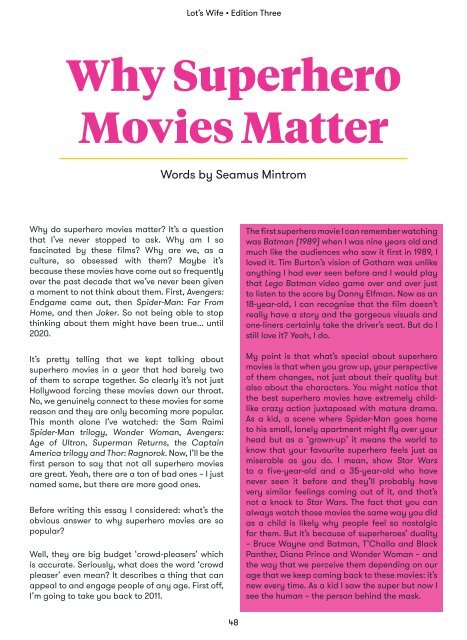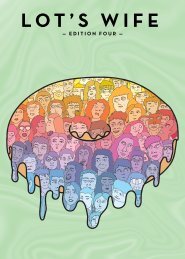Lot's Wife Edition 3 2021
- No tags were found...
Create successful ePaper yourself
Turn your PDF publications into a flip-book with our unique Google optimized e-Paper software.
Lot’s <strong>Wife</strong> • <strong>Edition</strong> Three<br />
Lot’s <strong>Wife</strong> • <strong>Edition</strong> Three<br />
Why Superhero<br />
Movies Matter<br />
Why do superhero movies matter? It’s a question<br />
that I’ve never stopped to ask. Why am I so<br />
fascinated by these films? Why are we, as a<br />
culture, so obsessed with them? Maybe it’s<br />
because these movies have come out so frequently<br />
over the past decade that we’ve never been given<br />
a moment to not think about them. First, Avengers:<br />
Endgame came out, then Spider-Man: Far From<br />
Home, and then Joker. So not being able to stop<br />
thinking about them might have been true... until<br />
2020.<br />
It’s pretty telling that we kept talking about<br />
superhero movies in a year that had barely two<br />
of them to scrape together. So clearly it’s not just<br />
Hollywood forcing these movies down our throat.<br />
No, we genuinely connect to these movies for some<br />
reason and they are only becoming more popular.<br />
This month alone I’ve watched: the Sam Raimi<br />
Spider-Man trilogy, Wonder Woman, Avengers:<br />
Age of Ultron, Superman Returns, the Captain<br />
America trilogy and Thor: Ragnorok. Now, I’ll be the<br />
first person to say that not all superhero movies<br />
are great. Yeah, there are a ton of bad ones – I just<br />
named some, but there are more good ones.<br />
Before writing this essay I considered: what’s the<br />
obvious answer to why superhero movies are so<br />
popular?<br />
Well, they are big budget ‘crowd-pleasers’ which<br />
is accurate. Seriously, what does the word ‘crowd<br />
pleaser’ even mean? It describes a thing that can<br />
appeal to and engage people of any age. First off,<br />
I’m going to take you back to 2011.<br />
Words by Seamus Mintrom<br />
The first superhero movie I can remember watching<br />
was Batman (1989) when I was nine years old and<br />
much like the audiences who saw it first in 1989, I<br />
loved it. Tim Burton’s vision of Gotham was unlike<br />
anything I had ever seen before and I would play<br />
that Lego Batman video game over and over just<br />
to listen to the score by Danny Elfman. Now as an<br />
18-year-old, I can recognise that the film doesn’t<br />
really have a story and the gorgeous visuals and<br />
one-liners certainly take the driver’s seat. But do I<br />
still love it? Yeah, I do.<br />
My point is that what’s special about superhero<br />
movies is that when you grow up, your perspective<br />
of them changes, not just about their quality but<br />
also about the characters. You might notice that<br />
the best superhero movies have extremely childlike<br />
crazy action juxtaposed with mature drama.<br />
As a kid, a scene where Spider-Man goes home<br />
to his small, lonely apartment might fly over your<br />
head but as a ‘grown-up’ it means the world to<br />
know that your favourite superhero feels just as<br />
miserable as you do. I mean, show Star Wars<br />
to a five-year-old and a 35-year-old who have<br />
never seen it before and they’ll probably have<br />
very similar feelings coming out of it, and that’s<br />
not a knock to Star Wars. The fact that you can<br />
always watch those movies the same way you did<br />
as a child is likely why people feel so nostalgic<br />
for them. But it’s because of superheroes’ duality<br />
– Bruce Wayne and Batman, T’Challa and Black<br />
Panther, Diana Prince and Wonder Woman – and<br />
the way that we perceive them depending on our<br />
age that we keep coming back to these movies: it’s<br />
new every time. As a kid I saw the super but now I<br />
see the human – the person behind the mask.<br />
We wear masks every day, and I’m not talking about<br />
those ones. I’m sure this has been drilled into you at<br />
school assemblies and in YouTube videos all your<br />
life but it’s true. I wear a mask, you wear a mask. It’s<br />
pretty much a fundamental aspect of the human<br />
condition, the struggle between our true selves and<br />
the one we are trying to display to the world. What is<br />
your real identity? Clearly this theme is not exclusive<br />
to superhero movies but literal masks as a metaphor<br />
for duality is present in almost all of them and is<br />
what makes them unique. For some heroes, their<br />
physical mask is the disguise, for others their face is<br />
the disguise, and in some cases, both are disguises<br />
and the real person is buried underneath. Despite not<br />
having a secret identity, Steve Rogers, aka Captain<br />
America, constantly grapples with being perceived<br />
as a living legend, but on the inside, he is really a<br />
man out of place in modern times. This is why in the<br />
final battle of Captain America: The Winter Soldier,<br />
his old-fashioned costume symbolises the values he<br />
holds onto, in an America he doesn’t recognise.<br />
Flash-forward to April 2018 and I’m watching<br />
Avengers: Infinity War in the cinemas on opening day<br />
with a crowd of fans who are collectively immersed<br />
in the world Marvel Studios built. This was the single<br />
greatest moment I’ve ever experienced in a theatre<br />
and I’m fairly certain that I’m not alone in saying<br />
that. Why though? It’s understandable that those<br />
who aren’t invested in the Marvel Cinematic Universe<br />
would label it a ‘roller coaster thrill’ out of context.<br />
But we have to remind ourselves why these movies<br />
are popular in the first place. Marvel didn’t grow to<br />
make consecutive billion dollar movies out of fan<br />
service or explosions. No, these movies are huge<br />
because people see themselves in Tony Stark and<br />
Steve Rogers.<br />
You might say that superheroes wearing masks is so<br />
far away from us but it’s exactly like us. Their duality is<br />
universal – they are always hiding something. Who’s<br />
the real person? Spider-Man, who rescues people,<br />
or Peter Parker, who works at the Daily Bugle and at<br />
a pizza delivery restaurant. Neither. The real Peter<br />
Parker is someone no one else knows. His apartment<br />
depicted in Spider-Man 2 is one of the rare places we<br />
truly see him unmasked. Similarly, behind the ego,<br />
the real Tony Stark has chronic anxiety issues and the<br />
real Bruce Wayne copes with unresolved trauma from<br />
the death of his parents. The silver screen is a mirror,<br />
at least to me. I, like everyone else, wear an invisible<br />
mask every day, so no wonder these characters are<br />
always on my mind.<br />
48 49<br />
Art by Ruby Comte


















